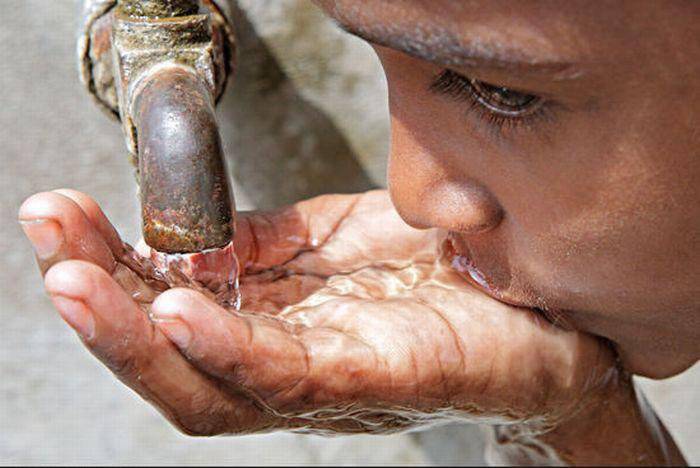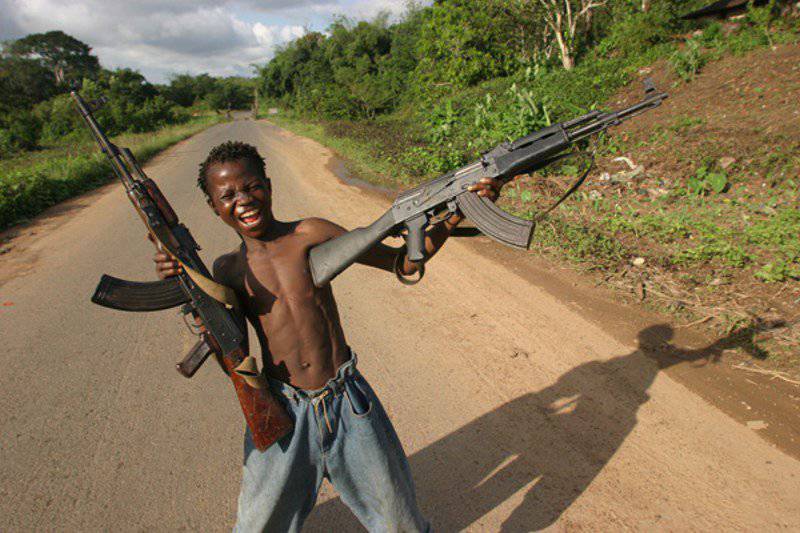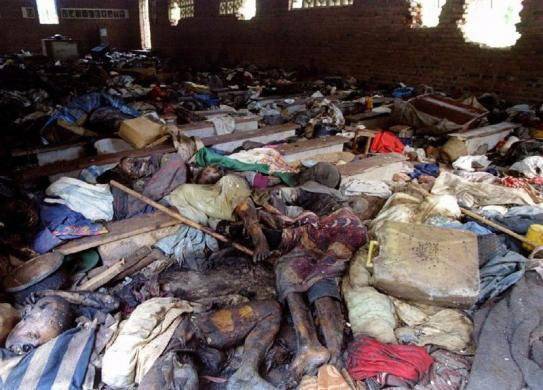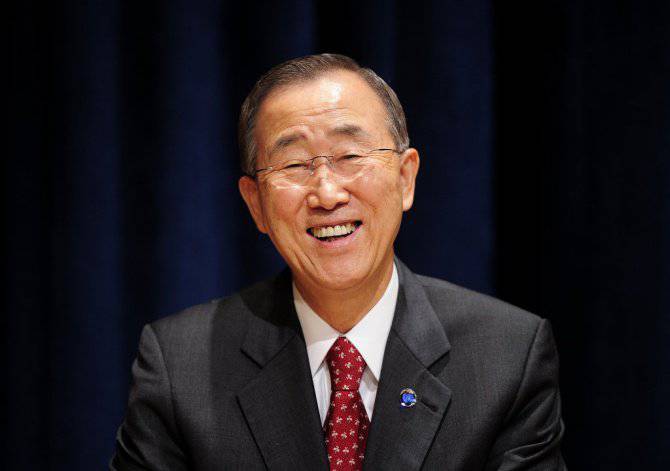Africa "Boiling Continent"

After the liberation of African countries from the colonial yoke, most of them did not find support for the concept of westernization, i.e. their orientation towards social institutions, standards of the law of the West, in particular the USA. But at the same time, the idea of geopolitical Africa (“islands”) to Eurasia, in particular to the Soviet Union, did not receive widespread development.
For Africa, the reputation of the most conflicting geopolitical sphere of the planet has been firmly established, especially in the last quarter of the 20th century. On the continent over the past 10 years, 35 major armed conflicts have been recorded, in which more than 10 million people died, 90% of them are civilians. On the continent there are almost half of the global number of refugees (according to various estimates - from 7 to 10 million people) and 60% of displaced persons (almost 20 million people). On the continent, the highest infant mortality rate in the world is about 8 million people per year.

This is due to the complex interweaving of various conflict factors: ethnic and clan opposition, confessional discord, contradictions of a socio-economic and political nature, etc. There are many works, especially in the West, which greatly simplify this problem, sometimes reducing the convulsive development of Africa to a banal scheme. Thus, one of the first works that laid the foundation for the theory of development was S. Huntington’s book “On the New Political Order in Transforming Societies,” where he, in particular, says: “The invasion of the masses into politics generates tension, which can create a threat to political stability and, as a result, for development itself. ”
At the beginning of the 1990's in Namibia, the conference “30 years of African independence: results and prospects” was held, where, as a generalized conclusion, it was said that 30 years of independence did not bring democracy or prosperity to the continent, but further deepened the economic and political crisis, i.e. geopolitically this “island” remained chained to the countries of Western Europe and the USA. The new geopolitical situation that has arisen after the liquidation of the USSR and the countries of the socialist camp left an additional negative imprint on the geopolitical balance in the world balance of forces.
Modern African states have different socio-political and socio-economic orientation. At the same time, regardless of social orientation and degree of social development, a common feature of African countries is the struggle for the elimination of age-old backwardness, the consolidation of their social sovereignty, economic independence, social progress, for the right to dispose of the wealth of its subsoil, its human and financial resources.
Africa continues to be torn apart by centuries of ethnic contradictions, which translate into civil wars and military conflicts.
The bloodiest of them began in 1994 in Rwanda and lasted almost two years. The government in power of the radical representatives of the Hutu people decided to “close” the national question for ever, organizing the mass destruction of the “hostile” Tutsi people, and massacred more than 1 million people. This can only be compared with the genocide of Armenians in Turkey in 1915, with the actions of the racists of the times of fascist Germany or the Khmer Rouge in Cambodia.

From the middle of July, 2003, in the West African country of Liberia, rich in diamonds, iron ore, and rubber, began a civil war that claimed hundreds of lives every day. Clashes between rebels and presidential troops take place in the capital, Monrovia. Local conflicts in Angola, Ethiopia, Sudan, Congo, Nigeria, Zimbabwe, Somalia, Mozambique, Sierra Leone, Chad do not subside.
The civil war in the Republic of Chad stretches with short interruptions from the 1960's, as in neighboring Sudan. Rebels move freely from one country to another. Many rebels in both countries do not care in which country to fight. For them, it is the territory of related tribes. They need money, water, food, pasture for livestock, land suitable for growing crops. In addition, oil was found in southern Chad and Sudan. This single source of foreign exchange earnings in the country has recently become an additional factor of tension.
In Africa, the main centers of separatism coincide with areas where there are proven oil reserves. Rich in this energy source, Eritrea broke away from Ethiopia. At the mouth of the Niger, local tribes are attacking oil platforms and demanding control over the income from the extraction of "black gold".
These and other social "sores" exacerbate the arms race, military conflicts. For example, the annual foreign aid to the countries of the continent amounts to 11 billion dollars, and the costs of armaments and the maintenance of the military exceed 12 billion. In fact, Ethiopia, Angola, Zaire are on the verge of a national catastrophe, where military clashes and even wars practically do not subside. Thus, Ethiopia and Eritrea confront each other, in Angola the military group of UNITA controls a significant part of the territory, including the water and airspace.
Military clashes occur in Mozambique, Sudan, Somalia and in some other countries. One of the main causes of the collision is the weakness of national economies. According to Professor Georges Nzongola Ntalazha (Zaire), the United States, France and Belgium are to blame for the collapse of the Zaire economy. In his opinion, these powers acted in the country "solely in the interests of the ruling puppet clique, which was more concerned about personal enrichment than the interests of the people."
The "peacekeeping" forces of Western countries are making their "contribution" to inciting civil wars. For example, in Chad there are “about 1,5 thousand French soldiers, mainly from the foreign legion, with military equipment, helicopters, airplanes, which give warning shots to the rebels”.
For these and other reasons, many African leaders met with hostility from the visit of former French Interior Minister N. Sarkozy to Senegal, Mali and other countries. In Mali, MPs demanded “cancel the visit”, regarding it as “pure provocation”. President of Senegal, Abdoulaye Wade, sharply criticized the "African policy of France."
The most characteristic feature of the development of the countries of the continent is the incompleteness of the formation processes due to the relatively short period after they have gained political independence. On the continent, various types of economic relations — from communal-patriarchal to capitalist and socialist — are difficult, and sometimes intricately intertwined. The social class differentiation of society is weak, the social structure includes remnants of communal-tribal and even tribal relations. The political system is dominated by various types of power: authoritarian-military-dictatorial, one-party, multi-party, democratic and monarchical, secret ritual, criminal.
In the sphere of spiritual ideological life, a wide range of different views is characteristic: from traditional African cultures and beliefs to Muslim and Christian religions, bourgeois and socialist ideas. Secret ritual societies support the conflagration of ethnic conflict wars in Liberia and Rwanda. They create a ritual power that goes into "the dark part of the day and the shadow economy, although their psychological influence on the population is still an important political factor in Africa, which is unreasonable to ignore."
In Mali, the “Union of Children of the Forest” is an association with a single system of ethnic representatives, ritual and ceremonial activities, as well as esoteric information that is inaccessible to the uninitiated. This secret association has the right to dispose of someone else's life, and the country's leadership "carried out regular informal contacts with the leaders of the union."
In the half-million Nigerian campus Ile-Ife, the top of a secret society has real administrative and economic power: “It conducts the activities of the mayor’s office and other urban institutions, supporting its entrepreneurship, regulating mystical means of pricing, imposing a ban and permits on certain types of economic work.”
Perhaps, like no other continent, Africa retains political and economic dependence on the outside world, especially on the countries of Western Europe and the USA, transnational corporations, and international financial centers. This dependence is constantly stimulated by global social problems: hunger, poverty, disease, illiteracy, low political and general culture of the people, acute economic and political crises, aggravation of interethnic, religious contradictions. Using these factors, the United States seeks to even more “tie” the richest resource continent. The president of the United States has made the congress of allocating 15 billion dollars (for contrast - 300 million dollars under President Clinton) to the program to fight AIDS, from which Africa is rapidly dying out.
Politically, countries in modern Africa are mainly authoritarian regimes (by the end of the twentieth century they dominated the 38 of the 45 states of tropical Africa). There are internal and external causes. The first include: underdevelopment; weak social class differentiation of society; the legacy of the colonial system (dictators - chiefs of tribes, nationalities - proteges of the colonial administration); lack of elements of civil society and the rule of law; low political culture of the population; interethnic contradictions; archaic infrastructure - bad roads, communications, etc.
But besides the internal reasons, the confrontation of two world systems - capitalism and socialism - in the struggle for influence on the continent contributed to the formation of authoritarian regimes. For 30 years, Africa has been a field of different types of rivalry between the two systems. These systems kept in power and fed various dictators who pursued their interests. People, as a rule, unquestioningly obeyed dictators, no matter how they came to power. The population, with the exception of the national elite, was the object, not the subject of politics and geopolitical relations. Hence the instability in all spheres of life in Africa: after 1960, more than 100 military coups took place in the independent states of the continent. Sometimes they were committed by sergeants and lieutenants, if they were provided with support from abroad.
The specific role of the army and political opposition in the form of separatist movements remains a specific phenomenon of most African countries. In the eyes of the people, the army is the guarantor and symbol of state independence, an organization capable of establishing and maintaining at least some order within the country and achieving more or less equal relations with the outside world. The army is a pillar and lever of power in almost all African countries — large ones like Nigeria, Zaire, Sudan, Ethiopia, Chad, Somalia, and smaller sizes.
In the geopolitical, regional alignment of forces in Africa, naturally, a large role is played by countries with a more powerful (large, trained, armed, etc.) army and considerable human potential. At the end of XX century. on this continent, about 2 million people were under arms. The largest armies: Egypt - 448 thousand (with a population of more than 61 million people); Morocco - about 196 thousand (more than 28 million); Algeria - about 122 thousand (more than 28 million); Ethiopia - 120 thousand (50 million); Angola - 82 thousand (more than 11 million); South Africa - 79 thousand (40 million).
In North African countries, which profess Islam, as a rule, the trend that seeks to create "Islamic statehood" is intensifying. Fundamentalist Islamic groups since the early 1990s
They openly embarked on the path of extremist actions, the “holy war” not only against secular forms of statehood (Algeria, Egypt, Sudan), but also against other religions and peoples.
The next specific factor of the “Black Continent”, which has a great influence on its geopolitical position, is inter-ethnic relations. The ethnic composition of Africa is a motley mosaic of nations, nationalities, tribes. There are about 50 nations and nationalities living on the continent, 3 thousands of tribes speaking thousands of languages. As a result of the colonial delimitation of the territory of Africa, state borders have nothing in common with the natural geographic and historical boundaries of the population. 44% boundaries are drawn along the meridians and parallels, and 30% along the straight and arcuate lines. Such a division of the territory was a time bomb, the basis of interethnic conflicts and wars, and their confrontation between the East and the West was fueled, the problem of choosing a path of social development, geopolitical orientations. All this contributed to the emergence of not only local interethnic conflicts, but also bloody wars, as mentioned above.
Since the beginning of the 1990's. ideas of interregional, intercontinental cooperation began to take root in the public consciousness on the continent. In the capital of Tanzania, Dar es Salaam, the African Center for Conflict Resolution has been created to encourage Africans to solve their own problems instead of relying on foreign mediation, but, unfortunately, it has not yet been possible to avoid this.
Many representatives of mondialism believe that the influence of his ideas will be so great that it will draw the population of the African continent into its orbit. But S. Huntington, whose work was mentioned in previous chapters, writes on this subject: "It would be obvious folly to believe that the West conquered the whole world because of the collapse of Soviet communism." In his opinion, the world geopolitics will be determined by the confrontation of various civilizations, where Western and non-Western civilizations will play a decisive role. Among the latter, he attributed, as we know, Confucian, Slavic-Orthodox, Latin American and African.
On the distribution, the interaction of force fields at the subregional, continental and intercontinental levels
There are many factors. But it is crucial, S. Huntington believes, that the peoples of different civilizations have different ideas about the relationship between God and man, the individual and the group, the citizen and the state, the relationship between rights and duties, freedom and power, equality and hierarchy. These differences are generated by a long history. They are deeper than the differences of political ideologies and regimes.
The destinies of Africa historically have long been associated with the destinies of the whole world. This continent became the cradle of humanity, gave the most powerful civilization (Ancient Egypt, Arab Caliphate, etc.), but the colonial era, and most importantly the slave trade, when Africa for nearly three centuries supplied labor to North and Latin America, slowed down the development of its peoples, isolated them from the influence of the world, significantly weakened the gene pool of the peoples of the continent. Colonialists (European countries) instilled a new way of life in the population, which is very different from traditional values. After gaining independence, each country in Africa chose its own development path: capitalist or socialist.
But, as life has shown, the Western and Soviet models of development, which do not take into account the realities of life on the continent, led to a further deepening of the economic crisis, social and political instability, regional and ethnic (including military) conflicts, increased hunger, poverty, increased dependence on allied countries. For example, in the middle of the twentieth century. the volume of production of goods and services of countries in tropical Africa was equal to the volume of production of a small European country - Belgium. According to economists from the Institute of African Studies of the Russian Academy of Sciences, the level of GDP produced on the continent per capita at the end of the twentieth century. was more than 20 times lower than in developed capitalist countries.
As a result of the interaction of these and other factors for the 1990-ies. GDP per capita in Africa decreased by 25%, while in countries of tropical Africa - by 30%, domestic investment decreased by 75%, exports - by 30%, imports - by 60%.
However, the UN countries that, pursuing the most humane goals, are trying to help African states, as well as various international humanitarian organizations, are not able to bring order to the “boiling continent”, while Africa does not have strong states that have serious influence to make peace, put pressure on conflict participants. In many countries of the continent they live by a certain principle: to achieve power, to get as much as possible from this, and after us even a flood.

Therefore, the XXI century. the majority of African countries met in a state of systemic crisis, the consequences of which are malnutrition and even hunger, the most dangerous diseases, illiteracy, horrific infant mortality, epidemics that claim tens of millions of lives. Plus, the catastrophic deteriorating environment and the almost complete lack of funds for environmental protection. Hence the short life expectancy - in Zambia, for example, it is 37 years.
The geopolitical position of Africa, its position in the system of international relations is largely dependent on a fundamental change in the international economic order in favor of creating the best (preferential) conditions for this continent. In the meantime, this order is objectively directed against the interests of the peoples of Africa. They can only oppose neocolonization on the basis of uniting all spheres of public life in most countries of the continent: economic, social, political, spiritual. But to solve this problem at the beginning of the XXI century. It seems unrealistic for a number of reasons (most of them are mentioned).
So, in geopolitical terms, Africa is more to the West, although this process is complex, dynamic and controversial. Nevertheless, Russia maintains contacts with the leaders of many countries of the Black Continent. In Angola, the Democratic Republic of the Congo, in Namibia and other countries, our specialists work - oilmen, pilots, miners.
Russia's policy towards settling African conflicts still remains passive.
Information